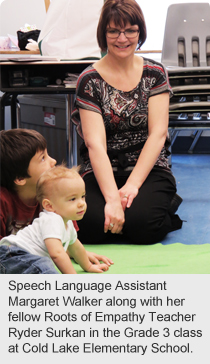
April 14, 2014
Story by Mark Evans; photo by Kari Whan
Speech Language Assistant Margaret Walker has a 6 month-old helper, Ryder Surkan, to engage children in the Grade 3 classroom she works with at Cold Lake Elementary School.
Ryder is the ‘Tiny Teacher’ for the Roots of Empathy program that Walker delivers in the classroom. This program has a lot of elements that complement the language and literacy building activities that Walker assists in developing in these children.
Walker is part of a unique partnership between Roots of Empathy and the school.
 Roots of Empathy is a non-profit organization that aims to build caring, peaceful, and civil societies through the development of empathy. Through this program, students at the school get to be a part of Ryder’s life and watch him grow and learn throughout the year.
Roots of Empathy is a non-profit organization that aims to build caring, peaceful, and civil societies through the development of empathy. Through this program, students at the school get to be a part of Ryder’s life and watch him grow and learn throughout the year.
For the past several years, Walker has worked in the school providing Alberta Health Services (AHS) speech services to students. A couple of years ago she learned of the Roots of Empathy program that teaches children emotional literacy while involving regular visits from a family and baby. A Roots of Empathy baby must be between 2 and 4 months old at the start of the program. This enables the students to observe a wide range of the infant's development over the year.
“It sounded like an awesome program and I immediately saw it as complementary to the speech services I was already providing,” says Walker.
“Roots of Empathy’s award-winning curriculum incorporates many best practices for facilitating communication between and among the students. All of our instructors participate in four full days of intensive training to learn how to engage students in techniques of observation, sharing and listening that are the foundation of interaction around the green blanket,” says Roots of Empathy Founder/President, Mary Gordon.
“Children learn the various ways a non-verbal baby communicates and they see how to nurture the turn-taking connected with the earliest stages of babble,” Gordon continues. “Everything that happens around the green blanket with the baby is translated to the children’s personal experiences.”
Walker attended one of the Roots of Empathy family sessions and knew that the format and philosophy of the program would embrace speech and language practices directly in the classroom.
The idea aligned perfectly with the AHS program’s approach of building capacity in the community to help all children with their language and speech skills. The school has the support of Cenovus Energy to train program instructors, so it wasn’t long before Walker was able to become a Roots of Empathy Instructor herself.
“It’s a preventative and proactive approach,” Walker explains. “Speech and language support that may have been delivered one-on-one to an individual child is complemented in a community setting to benefit all children. This provides a continuity and consistency of support for children who need help with speech and language skills.”
“Incorporating Margaret into actual classroom activities and curriculum is fantastic. She reaches every one of my students on a regular basis,” says Kari Whan who is the classroom teacher. “It makes a great difference to the students involved with speech and language services as well as those who aren’t.”
The Roots of Empathy activities that build social literacy such as storytelling, describing, taking turns, direction following, listening and problem solving are all part of the social language skills that Walker teaches in the classroom.
“It is so wonderful to watch the students engage in questions and conversations when we come into the classroom,” says Ryder’s mom, Rachelle Surkan. “The program seems to help students express their thoughts and feelings.”
Walker didn’t have to adapt the Roots of Empathy program or the AHS Speech Program to offer the programs together.
“It is a perfect fit,” Walker says.
”One essential component of the program is the sense of safety and security that is established by the Roots of Empathy Instructor around the green blanket,” notes Gordon. “In order to feel comfortable speaking of their feelings, children need to feel safe from criticism. Roots of Empathy does this.”
Gordon has witnessed this in classrooms around the world. “Children find their voice and all students participate because of the supportive learning environment the program provides. This happens even in children for whom English is a new language, children who feel academically unsuccessful, shy children, and children with speech or language challenges.”
Roots of Empathy provides Margaret an opportunity to see the students she helps individually, as part of a larger group.
“This gives her insight as to what they may need to work on when they are seen individually or in small groups,” Whan says.
With Roots of Empathy and the baby visits in the classroom the children are naturally engaged and involved in activities, says Walker.
“The students are so interested in what the baby can do each time they come. They notice little things that the baby can do that they couldn’t before,” said Whan. “Even students who were hesitant to share and express their feelings with Ryder have opened up and interacted with him,” says Surkan.
Children who Walker struggled to get participating in literacy skill building activities suddenly start participating when it involves the visiting baby.
“The kids just tune in; they are interactive and take ownership so other skills emerge.” says Walker.
For more information about speech language services in Cold Lake, contact the speech department at Cold Lake Community Health Services. For more information about the Roots of Empathy program, contact Sandy Vigrass, Provincial Manager for Alberta.
svigrass@rootsofempathy.org , 403-410-3808.